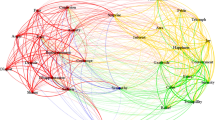Abstract
The present research refers to the relation between power and the self-ascription of agency and communion. One hundred and twenty participants—students of non-psychology majors—took part in the experiment conducted via the Internet. The participants were randomly assigned to three groups differing in the level of power primed: high power, low power and no power. The power was primed by having the participants recall situations of being in power over someone else (high power), being under someone else’s power (low power) or situations unrelated to power (no power). Participants’ self-ascription of agency and communion was measured twice—before and after power priming. Results showed that low power increases the self-ascription of communion whereas high power decreases the self-ascription of agency. The decrease in self-ascription of agency as a result of high power priming was influenced by the kind of interest pursued in stories described by the participants in the power priming task. This decrease was revealed only in the case of participants acting in another’s interest. The results are discussed in light of past research and possible implications.

Similar content being viewed by others
References
Abele, A., & Wojciszke, B. (2007). Agency and communion from the perspective of self versus others. Journal of Personality and Social Psychology, 93, 751–763.
Anderson, C., John, O. P., Keltner, D., & Kring, A. M. (2001). Who attains social status? Effects of personality and physical attractiveness in social groups. Journal of Personality and Social Psychology, 81, 116–132.
Bakan, D. (1966). The duality of human existence: An essay on psychology and religions. Chicago: Rand McNally.
Bruch, M. (2002). The relevance of mitigated and unmitigated agency and communion for depression vulnerabilities and dysphoria. Journal of Counseling Psychology, 49, 449–459.
Bugental, D. B., Blue, J., & Cruzcosa, M. (1989). Perceived control over caregiving outcomes: implications for child abuse. Developmental Psychology, 25, 532–539.
Chen, S., Lee-Chai, A. Y., & Bargh, J. A. (2001). Relationship orientation as a moderator of the effects of social power. Journal of Personality and Social Psychology, 80, 173–187.
Dunn, D. S., & Brody, C. (2008). Defining the good life following acquired physical disability. Rehabilitation Psychology, 53(4), 413–425.
Eagly, A. H., & Steffen, V. J. (1986). Gender stereotypes, occupational roles, and beliefs about part-time employees. Psychology of Women Quarterly, 10, 252–262.
Emerson, R. M. (1962). Power dependence relations. American Sociological Review, 27, 31–41.
Farmer, S. M., & Aguinis, H. (2005). Accounting for subordinate perceptions of supervisor power: an identity-dependence model. Journal of Applied Psychology, 90(6), 1069–1083.
Fiske, A. P. (1992). Four elementary forms of sociality: framework for a unified theory of social relations. Psychological Review, 99(689), 723.
Fiske, S. T. (1993). Controlling other people: the impact of power on stereotyping. American Psychologist, 48, 621–628.
Galinsky, A. D., Gruenfeld, D. H., & Magee, J. C. (2003). From power to action. Journal of Personality and Social Psychology, 85, 453–466.
Georgesen, J. C., & Harris, M. J. (1998). Why’s my boss always holding me down? A meta-analysis of power effects on performance evaluations. Personality and Social Psychology Review, 2, 184–195.
Georgesen, J. C., & Harris, M. J. (2000). The balance of power: interpersonal consequences of differential power and expectations. Personality and Social Psychology Bulletin, 26, 1239–1257.
Goodwin, S. A., Gubin, A., Fiske, S. T., & Yzerbyt, V. Y. (2000). Power can bias impression processes: stereotyping subordinates by default and by design. Group Processes and Intergroup Relations, 3, 227–256.
Helgeson, V. S. (1993). Implications of agency and communion for patients and spouse adjustment to a first coronary event. Journal of Personality and Social Psychology, 64, 807–816.
Helgeson, V. S. (1994). Relation of agency and communion to well-being: evidence and potential explanations. Psychological Bulletin, 116, 412–428.
Helgeson, V. Si., & Fritz, H. L. (1999). Unmitigated agency and unmitigated communion: distinctions from agency and communion. Journal of Research in Personality, 33, 131–158.
Keltner, D., Gruenfeld, D., & Anderson, C. (2003). Power, approach and inhibition. Psychological Review, 110, 256–284.
Kipnis, D. (1972). Does power corrupt? Journal of Personality and Social Psychology, 24, 33–41.
Magee, J. C., & Galinsky, A. D. (2008). Social hierarchy: the self-reinforcing nature of power and status. Academy of Management Annals, 2, 351–398.
Mosher, C. E., & Danoff-Burg, S. (2008). Agentic and communal personality traits: relations to disordered eating behavior, body shape concern, and depressive symptoms. Eating Behaviors, 9, 497–500.
Moskowitz, D. S., Suh, J. E., & Desaulniers, J. (1994). Situational influences on gender differences in agency and communion. Journal of Personality and Social Psychology, 66, 753–761.
Overbeck, J. R., & Park, B. (2001). When power does not corrupt: superior individuation processes among powerful perceivers. Journal of Personality and Social Psychology, 81, 549–565.
Piro, M., Zeldow, P. B., Knight, S. J., Mytko, J. J., & Gradishar, W. J. (2001). The relationship between agentic and communal personality traits and psychosocial adjustment to breast cancer. Journal of Clinical Psychology in Medical Settings, 8(4), 263–271.
Rusbult, C. E., Verette, J., Whitney, G. A., Slovik, L. F., & Lipkus, I. (1991). Accommodation processes in close relationships: theory and preliminary empirical evidence. Journal of Personality and Social Psychology, 60, 53–78.
Sedikides, C., & Skowronski, J. J. (1991). The law of cognitive structure activation. Psychological Inquiry, 2, 169–184.
Wojciszke, B., & Baryła, W. (2006). Perspektywa sprawcy i biorcy w spostrzeganiu siebie i innych [Agent and recipient perspective in the perceptron of the self and others]. Psychologia Społeczna, 1, 9–32.
Wojciszke, B., & Strużyńska-Kujałowicz, A. (2007). Power influences self-esteem. Social Cognition, 25, 427–494.




